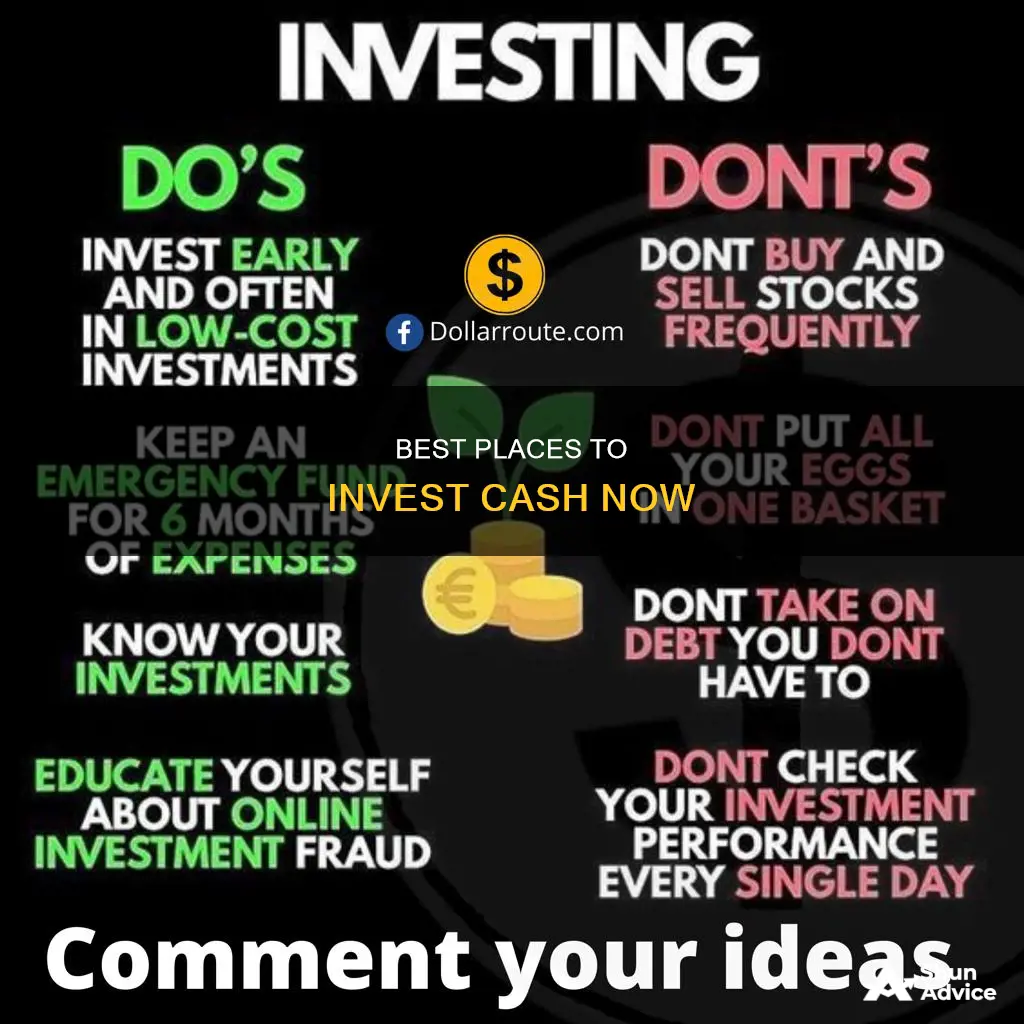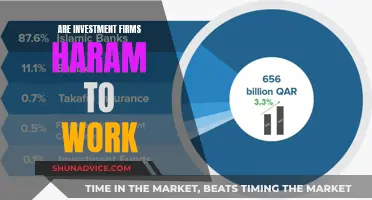
If you're looking for places to invest your cash right now, there are a few options to consider. These include high-yield savings accounts, money market accounts, certificates of deposit (CDs), government bonds, mutual funds, stocks, and exchange-traded funds (ETFs). The best option for you will depend on your financial goals, risk tolerance, and investment horizon.
Here's an overview of some of the key options:
- High-yield savings accounts: These accounts offer higher interest rates than traditional savings accounts and provide easy access to your money. They are suitable for short-term savings or emergency funds.
- Money market accounts: These accounts offer features similar to both savings and checking accounts, such as check-writing privileges and ATM access. They also provide FDIC insurance and competitive interest rates.
- Certificates of deposit (CDs): CDs are federally insured savings accounts that offer a fixed interest rate for a defined period, usually between three months and five years. They are suitable for money you know you will need at a specific date in the future.
- Government bonds: These are considered low-risk investments as they are backed by the government. They provide a steady stream of income but typically offer lower returns compared to other investments.
- Mutual funds: Mutual funds pool money from multiple investors to purchase stocks, bonds, or other assets. They are suitable for long-term goals like retirement and provide a diversified investment option.
- Stocks: Stocks offer the potential for higher returns but come with higher risk and volatility. They are suitable for investors with a well-diversified portfolio and a higher risk tolerance.
- Exchange-traded funds (ETFs): ETFs are similar to mutual funds but are traded on stock exchanges, providing more flexibility in buying and selling. They are a good option for investors who want a diversified investment but don't meet the minimum investment requirements for mutual funds.
Remember, it's important to consider your financial goals, risk tolerance, and investment horizon before deciding where to invest your cash. Diversifying your investments across different options can also help manage risk and maximize returns.
| Characteristics | Values |
|---|---|
| Accessibility | High liquidity, easy access |
| Safety | FDIC-insured, low risk, stable |
| Returns | High interest rates, good yields |
| Flexibility | No or low minimum balance, no withdrawal restrictions |
| Diversification | Wide range of investment options |
What You'll Learn

High-yield savings accounts
- Interest rates: Look for accounts with high interest rates, ideally about 10 times higher than the national average rate.
- Minimum deposit: Some accounts require a minimum deposit to open, so make sure you can meet this requirement.
- Fees: Check for monthly service fees and other charges, as these can eat into your balance.
- Withdrawal limits: There may be a cap on the number of monthly withdrawals you can make, so consider whether this will be an issue for you.
- Account access: If you want face-to-face support and easy access to your funds, choose an account with physical branches and a large ATM network.
- Online and mobile platforms: Explore the bank's website and mobile app to ensure they are user-friendly and offer the features you need.
- DCU Primary Savings Account: The only savings account that offers 6% APY. You can earn 6.17% APY on balances up to $1,000. However, there are membership eligibility requirements.
- My Banking Direct High-Yield Savings Account: Offers 5.55% APY on balances of $1 or more, with no monthly service fees. The minimum opening deposit is $500.
- EagleBank High-Yield Savings Account: Pays 5.38% APY on balances up to $500,000. The minimum opening deposit is $1,000.
- Western Alliance Bank High-Yield Savings Premier Account: Offers 5.36% APY on the entire account balance, with no account activity or maintenance fees. The minimum opening deposit is $500.
- BrioDirect High-Yield Savings Account: Offers a competitive rate of 5.30% APY and no monthly maintenance fees. The minimum opening deposit is $5,000.
- Forbright Growth Savings: Offers a high interest rate of 5.30% APY, with no minimum opening deposit or monthly service fee.
- Ivy Bank High-Yield Savings Account: Pays 5.30% APY on balances between $2,500 and $1 million. The minimum opening deposit is $2,500.
- TAB Bank High-Yield Savings Account: Pays a high interest rate with no monthly maintenance fee and no minimum opening deposit.
Remember to do your research and compare different accounts to find the best high-yield savings account for your needs.
REITs: Recession-Proof Investment?
You may want to see also

Money market accounts
- Earning a higher, competitive yield compared to a traditional savings account
- Easier access to savings without incurring penalties, making it a better place for an emergency fund than a timed savings account such as a CD
- Having a savings account that gives check-writing privileges and the ability to withdraw savings with an ATM card
- The freedom to deposit and withdraw cash whenever desired, although there may be limitations on withdrawals each month
- Vio Bank Cornerstone Money Market Account: This account offers a competitive yield of 5.30% APY on all balances. It requires a minimum opening deposit of $100 and does not charge a monthly fee.
- Quontic Money Market Account: This account offers a competitive yield of 5.00% APY on all balances. It has a minimum opening deposit of $100 and does not charge a monthly fee. It also comes with a debit card.
- Ally Bank Money Market Account: This account has no monthly service fee or minimum balance requirement. It offers a yield of 4.20% APY across all balance tiers and includes check-writing privileges and a debit card.
- Discover® Money Market Account: This account offers a yield of 4.00% APY on balances below $100,000 and 4.05% APY on balances above this amount. It has a minimum opening deposit of $2,500 but no requirement to maintain a minimum balance afterward. It includes check-writing and debit card privileges.
Cash Hoarding: Fear or Greed?
You may want to see also

Certificates of deposit (CDs)
CDs typically offer higher yields than other cash instruments, such as savings accounts and money market funds. For example, five-year CDs on Bankrate.com are yielding up to 4.50% per year, and one-year CDs are paying out up to 5.35%. The Federal Deposit Insurance Corporation (FDIC) insures CDs offered by banks, while the National Credit Union Administration (NCUA) insures CDs offered by credit unions. Both the FDIC and NCUA provide insurance for up to $250,000 per depositor, per bank.
One important thing to consider when investing in CDs is liquidity. CDs require you to lock up your money for a specified period of time, and withdrawing your funds early will result in a penalty. Therefore, CDs may not be the best choice for an emergency fund or if you need quick and easy access to your money. Additionally, the fixed-rate nature of CDs can be a disadvantage if interest rates rise during the term of the CD. On the other hand, if interest rates fall, you could benefit from locking in a higher rate for the duration of the CD term.
When deciding whether to invest in CDs, it is essential to weigh the benefits of higher yields against the lack of liquidity and the potential penalties for early withdrawal. CDs can be a good option if you are saving for a specific goal or if you want a conservative investment without the risk and volatility of the stock and bond markets.
Investments: Where Does the Money Go?
You may want to see also

Government bonds
Government bond funds purchase investments such as T-bills, T-bonds, T-notes, and mortgage-backed securities from federal agencies such as the Government National Mortgage Association (Ginnie Mae).
You can purchase them at virtually any online broker that offers ETF and mutual funds.
Short-term government bonds are good for risk-averse investors who want a very safe investment. A fund of short-term bonds also means an investor takes on a low amount of interest rate risk. So, rising or falling rates won't affect the price of the fund's bonds very much.
US government bond funds will pay a reliable rate of interest, though because of their safety, they won't pay as much as corporate bonds.
If you are looking for a straightforward bond investment, it's hard to beat US Treasury bonds. They are considered the safest in the world and are generally called "risk-free". The 10-year rate is considered a benchmark and is used to determine other interest rates, such as mortgage rates, auto loans, student loans, and credit cards.
Treasury yields are closely tied to the federal funds rate, so they should continue to move higher if the Federal Reserve keeps raising rates.
Short-term bonds offer some advantages over long-term bonds, depending on your investing needs. Because of their shorter duration, short-term bonds have less interest rate risk and are more likely to preserve the principal.
Short-term bonds are especially attractive right now because the yield curve has inverted, meaning short-term bond yields are higher than long-term bond yields.
If you are looking for another straightforward option, I Bonds, also known as I Savings Bonds, are a great way to earn interest and protect yourself from inflation. Through the end of April 2024, I Bonds were offering an interest rate of 5.27% (1.3% fixed and 3.97% variable).
People who buy I Bonds by the end of April 2024 will lock in the 1.3% fixed rate for the life of the bond (30 years), while the variable rate will reset every six months depending on inflation.
I Bonds also pay monthly rather than semi-annually, and they can't be traded. You have to wait a year to cash them in, and their maturities can last as long as 30 years.
Because they adjust for inflation, yields could fall if the inflation rate goes down.
Investment Bankers: Why All the Hate?
You may want to see also

Mutual funds
Fidelity Blue Chip Growth (FBGRX)
FBGRX has a strong focus on information-technology stocks and invests in large- and mid-cap growth stocks with strong prospects. It has a 27.9% YTD performance and a 22.2% historical performance over the last five years. The expense ratio is 0.48%.
Shelton Nasdaq-100 Index Investor (NASDX)
This fund aims to replicate the performance of the Nasdaq-100 index. It has a 17.9% YTD performance and a 21.6% historical performance over the last five years. The expense ratio is 0.52%.
Victory Nasdaq-100 Index (USNQX)
USNQX tracks the performance of the Nasdaq-100 index. It has a 17.9% YTD performance and a 21.4% historical performance over the last five years. The expense ratio is 0.45%.
Fidelity Large Cap Growth Index (FSPGX)
FSPGX typically invests at least 80% of its assets in the Russell 1000 Growth index of large-cap stocks. It has a 21.5% YTD performance and a 19.6% historical performance over the last five years. The expense ratio is 0.035%.
AB Large Cap Growth Advisor (APGYX)
APGYX is an actively managed fund that invests in profitable U.S. large-cap stocks with strong opportunities for long-term growth. It has a 20.6% YTD performance and a 17.5% historical performance over the last five years. The expense ratio is 0.6%.
Fidelity Mega Cap Stock Fund (FGRTX)
FGRTX invests in the market's largest stocks, such as those in the Russell 200 or S&P 100, and owns both growth and value stocks. It has a 17.9% YTD performance and a 17.1% historical performance over the last five years. The expense ratio is 0.59%.
State Street US Core Equity Fund (SSAQX)
SSAQX invests in U.S. large- and mid-cap companies with low relative valuations, strong balance sheets, and high-quality management. It has an 18.1% YTD performance and a 16.7% historical performance over the last five years. The expense ratio is 0.14%.
When choosing a mutual fund, it's important to consider your financial goals, risk tolerance, and investment horizon. Additionally, look at the fund's track record, fees, and investment strategy to ensure it aligns with your objectives.
Why People Avoid Investing
You may want to see also
Frequently asked questions
Some good short-term investment options include high-yield savings accounts, money market accounts, and certificates of deposit (CDs). These options offer stability, low risk, and liquidity, making them ideal for storing cash that you'll need within the next few years.
Government bonds are very safe and low-risk, making them ideal for short-term investments. They are issued by the government, so they are virtually risk-free. Plus, the market for U.S. government bonds is highly liquid, allowing you to sell and access your money easily.
When deciding where to invest your cash, consider the accessibility of your money, the level of risk you are comfortable with, and any restrictions, such as minimum balance requirements. It's important to find a balance between liquidity and yield, as there is usually a trade-off between the two. Additionally, consider the impact of inflation and how it may affect your returns.







